I've not been in many fights, but I appreciate knowing when I'm in one. You and I are often on the losing end of a battle for joy and awe. You may be surprised you’re even in this fight, so I’m here to help.
I eavesdrop more than I should. As a person who speaks and writes at the intersection of faith and the human condition, I prefer to see my listening to others as research. I have a vested interest in what’s on the hearts and minds of those I live around. So if people are talking, I listen.
My wife and I recently traveled with another couple to Sequoia National Park. Among the majestic giants, the public conversations I heard centered on something more sublime than normal.
Gone were the usual mundane conversations. All the debates instigated by the world’s “conflict entrepreneurs” (my new favorite term for news programming and social media companies) ceased. The discussions about the frustrating state of things, politicians, and the pay of athletes all fell away like autumn leaves. Even the chat around the price of eggs or where to shop to save a few dollars yielded to a hushed reverence and talk of what we wanted to stand in awe of next.
It was beautiful that it happened, but tragic that it took a national park to do it. Are joy and awe only on offer in the rarest of settings? I don't think we believe that, but the problem is live as if it's the case.
Early in our lives as toddlers we stumble through the world in a perpetual state of awe and joy. However, both are eventually squeezed from our lives except in the rarest of moments. This is partly a product of necessity; we have bills to pay after all, but part of it is a willing (albeit often unconscious) surrender.
The quiet loss of joy and awe we’ve suffered at the hands of the pressures of economic systems, corporations, social, and work expectations is partly the result of our lack of intention. We could know awe and joy more often, but somehow being good eggs, diligent, focused workers, or productive citizens (whatever that means) has meant we’ve let others force the conversations they’d prefer we value into our lives. The problem is, we know we don’t have the same values as they do. They have won the fight for the space of our joy and awe, not because we agree their values are right, but because they’re utterly rampant and hard to avoid. We’re losing a fight we didn’t know we were in.
A way forward
One small push back is related to smartphone use. It’s small, but the effect can be big. When I wake up, I make sure to go outside before I look at my phone. Before I allow the limit of my vision to be set by work, companies out to sell me things, algorithms, or fear-mongering, rage-baiting, click-hungry, social media conglomerates, I see the wide open world as the true ‘borders’ of my life. It’s a matter of pushing back at the start. My life isn’t limited to the struggles they want me to focus on in their war for my attention. As they compete for ad dollars and my ‘engagement,’ they’ve created very small corrals of thought that can seem like the things that should matter most to anyone on earth. They’re in it for our attention, not some altruistic goal of goodness or even to demonstrate how to be engaged for good.
So as I stood at the base of trees that have outlived empires and will likely outlive me, I was newly made aware of my birthright of awe and joy. Of course, the routine of life once we got back from vacation made those things harder to access, but it merely means I have to be more intentional.
Maybe trees don’t bring you out of the usual conversation loops about who’s wrong or the most awful thing you’ve heard of lately. But whatever does break the money-driven cycle of present dumpster fire obsession, I believe you have proof in that moment by the sea, next to an infant’s crib, or running your fingers over a quilt that you were meant for more than the conversations you’ve been assigned.
Below is a poem from Mary Oliver. Even if you’re not a poetry fan, Oliver tends to be far easier to understand than many poets, and I believe you’ll enjoy it even if poetry isn’t your thing.
Be well, friends.
"The Country of the Trees" by Mary Oliver
The Country of the Trees
There is no king in their country
and there is no queen
and there are no princes vying for power,
inventing corruption.
Just as with us many children are born
and some will live and some will die and the country
will continue.
The weather will always be important.
And there will always be room for the weak, the violets
and the bloodroot.
When it is cold they will be given blankets of leaves.
When it is hot they will be given shade.
And not out of guilt, neither for a year-end deduction
but maybe for the cheer of their colors, their small flower faces.
They are not like us.
Some will perish to become houses or barns,
fences and bridges.
Others will endure past the counting of years.
And none will ever speak a single word of complaint,
as though language, after all,
did not work well enough, was only an early stage.
Neither do they ever have any questions to the gods --
which one is the real one, and what is the plan.
As though they have been told everything already,
and are content.
by Mary Oliver, from Blue Horses




